Between wish and can
Adelina Marini, April 7, 2011
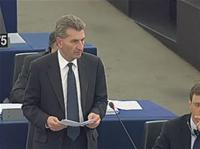 Several problems emerged during the debate in the European Parliament on April 6 on the future nuclear stress tests and the standards for nuclear safety. What to do with those nuclear power plants that fail the tests, the future of nuclear energy in the EU in general, development of alternative energy resources and the usual problem with sharing of competences between the European institutions and the member states. Of all the opinions heard during the two-hour debate it also became clear that all arguments are generally right but practically are more and more hard to live together.
Several problems emerged during the debate in the European Parliament on April 6 on the future nuclear stress tests and the standards for nuclear safety. What to do with those nuclear power plants that fail the tests, the future of nuclear energy in the EU in general, development of alternative energy resources and the usual problem with sharing of competences between the European institutions and the member states. Of all the opinions heard during the two-hour debate it also became clear that all arguments are generally right but practically are more and more hard to live together.
Some of the above mentioned problems were defined in the very beginning of the debate by Hungarian State Minister of European Affairs Enikő Győri who said that EU neighbouring countries must raise their standards for nuclear safety. Besides, the stress tests should cover the broader issue that the security of deliveries should not be considered more important than environment and public health, i.e. the tests should not cover only nuclear energy. In her words, nuclear installations should not be closed without prior coordination at Community level and without having considered alternative sources.
Every country has a different energy mix and this has to be the basis for any future actions at European Union level, Ms Győri said. The EU Commissioner for 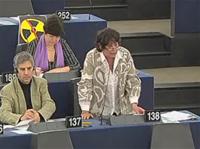 Energy, the German Gunter Oettinger, sounded pragmatically-realistic in his speech. He said that incidents like those in Japan could not be used as a basis for future development of nuclear energy.
Energy, the German Gunter Oettinger, sounded pragmatically-realistic in his speech. He said that incidents like those in Japan could not be used as a basis for future development of nuclear energy.
The common criteria for nuclear stress tests will be ready in the middle of May, Gunter Oettinger said and added that in the end of the year a comprehensive check of the safety of all the 143 nuclear power stations in the European Union will be held. Besides, the Commissioner reported, the Commission had already contacted Russia and Ukraine regarding inspections in EU neighbouring countries. Such contacts are to be held with Switzerland and Armenia, as well as with countries who plan building NPPs like Turkey and Belarus.
The EU Commissioner was heavily criticised by MEPs that the planned stress tests would not be sufficient; that they are not obligatory; and that they should require member states to commit to eliminate any problems the tests might reveal or to stop failed facilities. Also criticised was the idea the stress tests to be realised by national regulators. "We cannot oblige member states to control themselves. This must be done by independent experts in full transparency", Lena Ek said, MEP from the Alliance of Liberals and Democrats for Europe (ALDE) in the European Parliament.
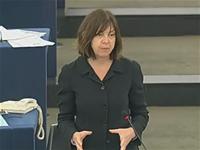 Even more criticising was Rebecca Harms from the group of the Greens/European Free Alliance. She said that she could not trust the results from the stress tests as it was illogical the tests and the analysis of the results to be in the member states' competences. According to her, the supervising bodies will cover for each other. "Do you really believe that the countries will admit that they were too tolerant?", the MEP asked.
Even more criticising was Rebecca Harms from the group of the Greens/European Free Alliance. She said that she could not trust the results from the stress tests as it was illogical the tests and the analysis of the results to be in the member states' competences. According to her, the supervising bodies will cover for each other. "Do you really believe that the countries will admit that they were too tolerant?", the MEP asked.
What was impressive during the entire debate was that everyone was aware that, if it came to stopping nuclear facilities because of failure to the safety standards, this would lead to "radical changes in the energy sector", in the words of Ms Harms. This is why it was proposed, except the creation of a road map for taking out of exploitation, a strategy to be created for closure of nuclear facilities. In this context, 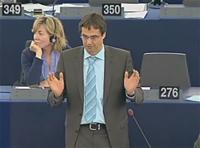 however, another German MEP, Peter Liese from the group of the People's Party of Europe (PPE) warned against compensating with additional imports of gas from Russia. "Let's focus on energy efficiency and renewables", Mr Liese added.
however, another German MEP, Peter Liese from the group of the People's Party of Europe (PPE) warned against compensating with additional imports of gas from Russia. "Let's focus on energy efficiency and renewables", Mr Liese added.
Almost all MEPs who spoke in the plenary were unanimous that the stress tests the Commission plans to hold will not be sufficient. Various ideas were heard, some of which indeed radical. For example ALDE MEP Fiona Hall proposed the EU member states to impose a moratorium on planning and exploiting new plants, following the example of Germany. The creation of international safety standards in the framework of the G20, offered another MEP. The Polish, Boguslaw Sonik from the PPE said that member states should not be allowed to buy electricity from nuclear facilities in neighbouring countries unless they had passed stress tests according to the European standards.
His statement started with recalling the sad fact that on April 26 is the 25th anniversary of the Chernobyl disaster. In his words, the isotope of Cesium 137 has a period of disintegration of 30 years. There are still contaminated foods in Ukraine, and the zone of nuclear contamination is in a 30 km radius from Chernobyl, he quoted Greenpeace data.
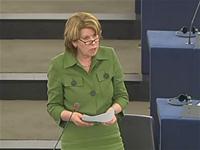 In the end of the debate Commissioner Oettinger poured MEPs' pathos with a cold shower. Regarding the insistence the community approach to prevail in the nuclear stress tests and the calls for independent expertise he recalled that the Treaty of Lisbon is in force for only a year and a half and it envisages broad powers for the member states in the area of energy. "I would also like the EU to have powers regarding the structure of energy mixes of the countries, but in the coming years they will have the power to decide in that area", Oettinger admitted.
In the end of the debate Commissioner Oettinger poured MEPs' pathos with a cold shower. Regarding the insistence the community approach to prevail in the nuclear stress tests and the calls for independent expertise he recalled that the Treaty of Lisbon is in force for only a year and a half and it envisages broad powers for the member states in the area of energy. "I would also like the EU to have powers regarding the structure of energy mixes of the countries, but in the coming years they will have the power to decide in that area", Oettinger admitted.
He caused unhappy faces among the MEPs by saying also that in the Lisbon Treaty is stipulated the goal the EU to achieve 20% share of renewables and that it depended on the member states whether they would change the proportion. The Commissioner directly concluded that in order the EU to have any powers to increase the share of renewables, the Lisbon Treaty must be amended - something which would lead to a series of referenda in many countries in the EU, avoided hardly with cosmetic amendments regarding the economic governance of the euro area.
Mr Oettinger was especially clear regarding Rebecca Harms's criticism. Turning to her he said that he had no reason not to trust the national regulators for the stress tests. "Ms Harms, we the Germans should not always think that we are better in 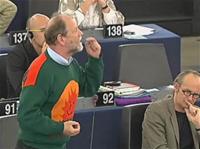 everything. Let us trust Poland too. The Germans are really keen on thinking that they can impose their will at the EU level, but let us have the necessary respect towards France, Poland, the citizens' will who have democratically elected their governments".
everything. Let us trust Poland too. The Germans are really keen on thinking that they can impose their will at the EU level, but let us have the necessary respect towards France, Poland, the citizens' will who have democratically elected their governments".
He too defended the thesis that the inspections must be obligatory for all. Again replying to Ms Harms he promised that he would ensure full transparency of the process of development of the criteria for the inspections and for the tests themselves.
This entire debate took place in the middle of a remarkable scandal in Bulgaria regarding the construction of a second nuclear power plant in Belene. The scandal erupted after Minister of Energy Traycho Traykov revealed that the Director of the National Electricity Company, Krassimir Parvanov, had signed without a mandate from the government an annex with Atomstroyexport, thus legally binding the country to agree on a price for the plant by the end of June this year. This revelation was interpreted as a confirmation that the construction of the already started plant, near the border with Romania, would beging only because of the signature of a relatively low level official.
This scandal unleashed sharp criticism in the country but the most puzzling of all was the 24-hour long silence of the prime minister who, during the election campaign in 2009, said he was against the construction of a second nuclear power plant. Then, after heading the government, he changed his position several times, thus increasing the feeling for a strong pressure from Russia.
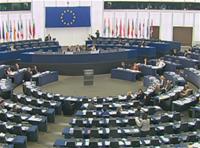 In this context it is interesting that during the debate in the European Parliament not even one of the 18 MEPs from Bulgaria took the floor to outline a position. We were told after the debate that Ivaylo Kalfin, an MEP (S&D) and former minister of foreign affairs, had filed a written statement for the lack of plenary time. In it he called the EU to adopt as soon as possible minimal safety standards, obligatory for all nuclear facilities in the EU. Moreover, these standards should be endorsed before holding the nuclear stress tests this year.
In this context it is interesting that during the debate in the European Parliament not even one of the 18 MEPs from Bulgaria took the floor to outline a position. We were told after the debate that Ivaylo Kalfin, an MEP (S&D) and former minister of foreign affairs, had filed a written statement for the lack of plenary time. In it he called the EU to adopt as soon as possible minimal safety standards, obligatory for all nuclear facilities in the EU. Moreover, these standards should be endorsed before holding the nuclear stress tests this year.
Before the debate we received the written response of the European Commission to the question of Nadezhda Neynsky, a Bulgarian MEP (PPE), about Belene's safety. In its response the Commission says that by the end of the year the entire European legal and regulatory framework for nuclear safety will be reviewed, which includes reviewing the seismic risk in the area of Belene.
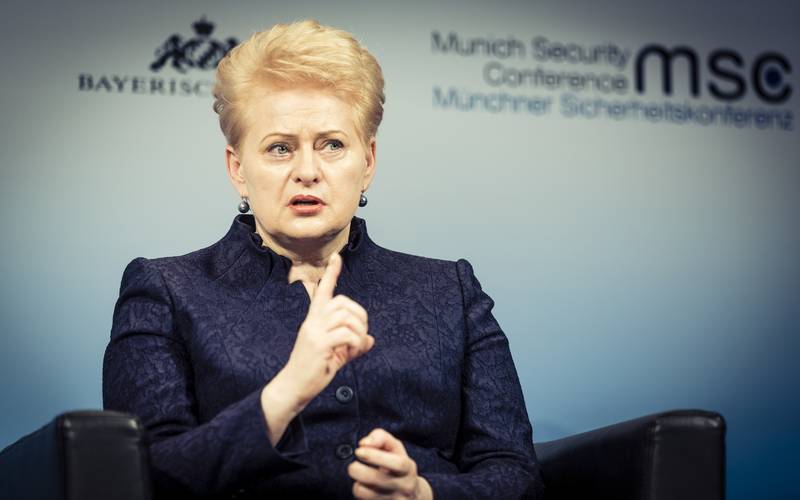 Dalia Grybauskaite | © MSC/Koerner
Dalia Grybauskaite | © MSC/Koerner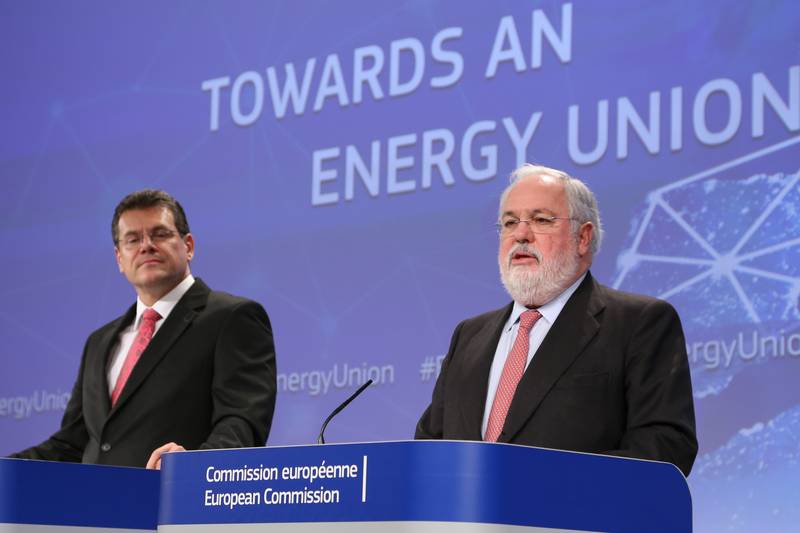 Maros Sefcovic, Miguel Arias Canete | © European Commission
Maros Sefcovic, Miguel Arias Canete | © European Commission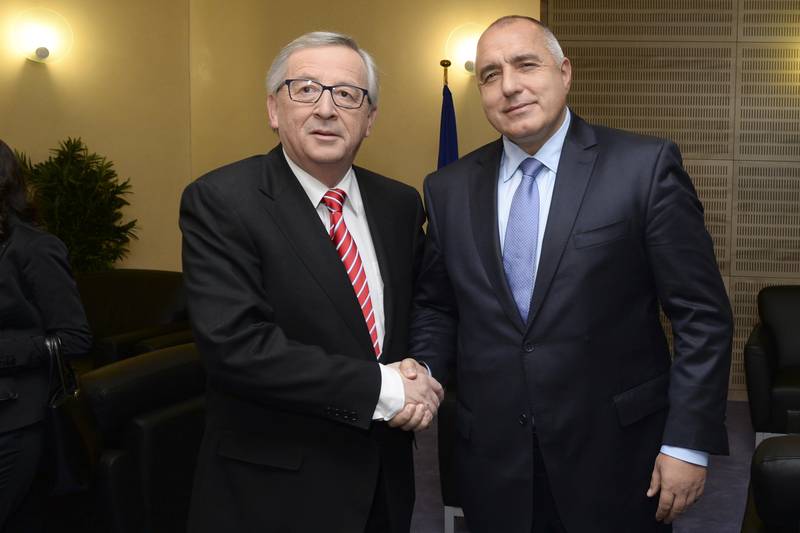 Jean-Claude Juncker, Boyko Borissov | © European Commission
Jean-Claude Juncker, Boyko Borissov | © European Commission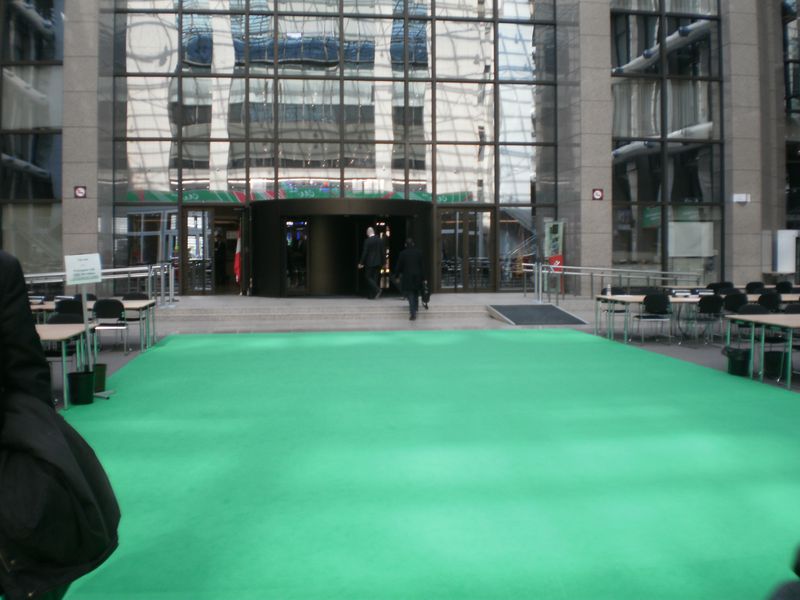 | © Ralitsa Kovacheva | www.euinside.eu
| © Ralitsa Kovacheva | www.euinside.eu